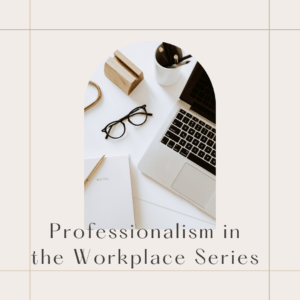Professionalism in the Workplace Series: Part I

Professionalism in the workplace may have changed since the global pandemic started but it is still a key factor in success. With virtual meetings still taking place, new professional etiquette has been developed this past year. This includes muting yourself when not speaking, continuing to dress professionally (at least the top half), having a neutral background and more. Email and telephone etiquette has continued to be a key part of the workplace.
This is part one of our series on professionalism. The Assistant Provost and Dean of Students at Embry-Riddle Aeronautical University’s Daytona Beach campus, Lisa Kollar, answers a few questions as to why professionalism is essential in our ever evolving workplace.
What is your personal definition of professionalism?
A professional is a person who is reliable, respectful, and possess integrity, work ethic, empathy, positive attitude, and care. They consistently take pride in themselves and their work.
In this new virtual world, has professionalism changed? If yes, for the better or worse?
We have proven that conducting meetings, workshops, and conferences in a virtual setting is as effective as face-to-face interactions. But there is still room to improve the way we present ourselves in the virtual world, even for the most seasoned professional. From Zoom to Teams and email to phone calls, it’s important to approach each situation with professionalism. For example, if you are on a virtual meeting in your PJs, eating while you meet, or not engaging at all, that can impact how attendees view you personally. If you don’t want to show your space or are in a noisy location, there are things you can do to still engage. Have a professional background so you can turn on your video; people like eye contact, even if it’s over a screen. Use the chat function if you aren’t in a position to speak without interruption. When emailing, use clear and professional language, and phone calls should be the same way. I feel that if we can learn to participate virtually like we do in-person then we can continue to increase our paths to engagement and connection.
What is your advice if someone does not agree on a decision by their supervisor? What is the best professional approach in this situation?
I have had the privilege of working with many different supervisors over the years, and from the beginning with each person, I do my best to establish open and honest communications. I am respectful but feel confident in approaching them and discussing situations and sharing my point of view, even if it challenges the status quo. In these situations, I use sound information and data, if possible, to help support the reason why I am asking them to consider my perspective. One lesson learned is that a supervisor often has more information than me about what went into a decision. Once I have all of the information available to me, I feel that my conversation has been productive and often results with a compromised solution that benefits all involved. However, I know when to listen, accept, and move on. I find it completely unprofessional to jump a supervisor’s head to get to the next level and challenge. This is an undermining approach, often giving you a negative reputation. My advice is to be willing to advocate but to know when to pursue further or come to an understanding of why the decision was made.
Aviation is a close-knit community. How does the industry perceive individuals who have a reputation for unprofessionalism or unprofessional behavior?
Indeed, aviation is a small world, and paths will cross many times in our industry. First, second, and even third impressions last, and it only takes one negative experience for people to be labeled as unprofessional. As a leader, I receive a lot of feedback from various sources, including social media, and this insight often surrounds a person’s experience or impression of our students, staff, community, etc. I can assure you that when people consistently display unprofessionalism it is known, shared, and can follow them, and it can impact their ability to be successful. While it’s hard to change someone’s perception of a negative experience, you can overcome it if you find yourself in this situation. Ask for another opportunity to make a positive impression or change your approach to one of respectful helpfulness, based in professionalism.
What final advice do you have for students/alumni to continue to always be professional in the workplace?
I have and will continue to encourage you no matter where you are in your career to self-reflect often and ask yourself, “do you like who you see, and do you display professionalism?” If not, then work on it – attend a workshop, read books, and find a mentor(s) willing to share their constructive advice. You can choose to listen and work on the areas in which you are weak. I feel strongly that if you work hard to be the best you can be it will help you reach your goals and be respected for your professionalism.
